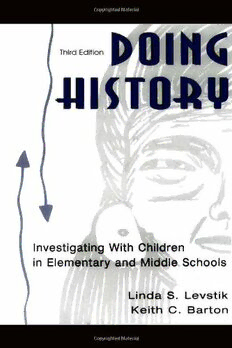
Doing History: Investigating with Children in Elementary and Middle Schools, Third Edition PDF
255 Pages·2005·19.801 MB·English
Most books are stored in the elastic cloud where traffic is expensive. For this reason, we have a limit on daily download.
Preview Doing History: Investigating with Children in Elementary and Middle Schools, Third Edition
Description:
Doing History: Investigating With Children in Elementary and Middle Schools, Third Edition offers a unique perspective on history instruction in the elementary and middle grades. Through case studies of teachers and students in diverse classrooms and from diverse backgrounds, the text shows children engaging in authentic historical investigations, often in the context of an integrated social studies curriculum. The authors begin with the assumption that children can engage in valid forms of historical inquiry-collecting and analyzing data, examining the perspectives of people in the past, considering multiple interpretations, and creating evidence-based historical accounts. Vignettes in each chapter show communities of teachers and students doing history in environments rich in literature, art, writing, discussion, and debate. Teachers and students are shown working together to frame and investigate meaningful historical questions. Students write personal and family histories, analyze primary and secondary sources, examine artifacts, conduct interviews, and create interpretations through drama, narrative, and the arts. The grounding of this book in contemporary sociocultural theory and research makes it particularly useful as a social studies methods text. In each chapter, the authors explain how the teaching demonstrated in the vignettes reflects basic principles of contemporary learning theory; thus they not only provide specific examples of successful activities, but place them in a theoretical context that allows teachers to adapt and apply them in a wide variety of settings. Features include: *Classroom vignettes. Rather than a "cookbook" of lesson ideas, this text illustrates the possibilities (and obstacles) of meaningful teaching and learning in real classroom settings. *Inquiry-oriented instruction. The approaches shown in the classrooms portrayed derive from current theory and research in the field of history education. This text is not a hodge-podge of activities, but a consistent and theoretically grounded illustration of meaningful history instruction. *Diversity of perspectives. This is emphasized in two ways. First, the text helps students look at historical events and trends from multiple perspectives. Second, the classrooms illustrated throughout the book include teachers and students from a variety of backgrounds--this gives the book widespread appeal to educators in a range of settings. *Assessment. Teachers are provided with clear guidance in using multiple forms of assessment to evaluate the specifically historical aspects of children's learning. New in the Third Edition: *Greater attention is given to the role of history education in preparing students for participation in a pluralist democracy. *Connections are made between instructional activities and the aims of citizenship, reflecting the authors' view that history should contribute to deliberation over an evolving common good. *Examples are provided of techniques for scaffolding discussion about controversial issues and for grounding that discussion in historical study. *International comparisons are included to encourage reflection on the range of perspectives on history education across cultures. *Bibliographies are updated to incorporate new scholarship on historical thinking and learning. *New resources are included for children's literature that supports good teaching.
See more
The list of books you might like
Most books are stored in the elastic cloud where traffic is expensive. For this reason, we have a limit on daily download.
